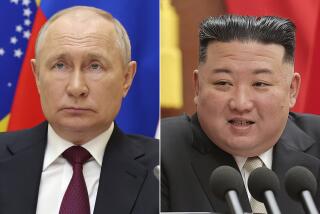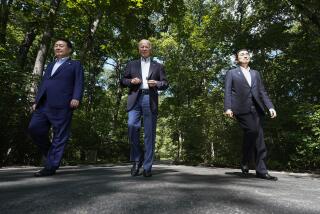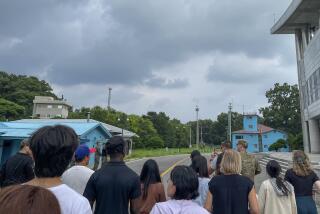U.S. tries to build consensus on N. Korea
- Share via
WASHINGTON — American diplomats worked Friday to allay Japanese concerns and address other problems with a key agreement needed to salvage negotiations over North Korea’s nuclear disarmament, further delaying its completion, U.S. officials said.
U.S. officials have been predicting that an understanding on rules for verification of North Korea’s disclosures about its plutonium-based nuclear program is imminent. The agreement, which is key to the larger disarmament deal, would also open the way for the U.S. to take North Korea off its official list of countries that it says sponsor terrorism.
North Korean officials have been increasingly upset that they have not been dropped from the list, and have increased pressure by taking steps that suggest they are ready to restart their suspended nuclear weapons program. U.S. officials view the overall disarmament deal as a major part of President Bush’s foreign policy legacy, and have been hurrying to complete as much of it as they can before he leaves office Jan. 20.
But Japanese officials have expressed concern that it does not go far enough to ensure that Pyongyang will disclose and eventually shut down its program, officials said. Japanese Prime Minister Taro Aso is to meet Sunday with U.S. Ambassador J. Thomas Schieffer in Tokyo.
Gordon Flake, an expert on Korea at the Mike and Maureen Mansfield Foundation, a Washington think tank, said Japanese officials have been uneasy about the agreement for some time. It focuses on North Korea’s plutonium facilities, but it does not address Pyongyang’s missile capabilities or its history of abducting Japanese citizens.
“The point where we’re now at is to ensure that everybody agrees,” Sean McCormack, the State Department’s spokesman, said at a regular briefing.
The Japanese Embassy did not immediately respond to a request for comment.
Despite the holdup, analysts expect Japan to eventually agree to a deal negotiated by Washington. In Tokyo, Japanese Foreign Minister Hirofumi Nakasone said that his country would accept a U.S. decision to remove North Korea from its terrorism sponsor list, as long as the move appeared reasonable.
The Associated Press quoted Nakasone as saying that Japan didn’t know exactly what the U.S. would propose. “If the decision is something that is also satisfactory to our country, that’s all we ask for,” he said.
South Korean officials were taking a wait-and-see attitude. President Lee Myung-bak, newly elected, has taken a back seat in the talks.
“Officially, there would be an acceptance in Seoul of the U.S. decision to take North Korea off the list, but I would not say at this stage that they are welcoming it,” said Scott Snyder, a senior associate of the Asia Foundation and a specialist on North Korea.
“These days you don’t hear as many conflicting voices in South Korea on these issues. That’s reflective of the overall mood that this is an issue for the U.S. to take the lead on. The South Koreans are not going to rock the boat,” he said.
Chinese officials are hoping any deal would maintain the political status quo on the Korean peninsula.
“That’s the ball China wants to keep in the air -- stability on the peninsula,” Snyder said. “What they don’t want to see is any escalation between the U.S. and North Korea. It’s not in their best interests.”
Analysts said that both South Korea and China believe the U.S. is likely to make concessions to reach some kind of deal. Snyder said South Korea regards the North’s recent maneuvers as a typical effort to increase its leverage.
--
paul.richter@latimes.com john.glionna@latimes.com
Richter reported from Washington and Glionna from Beijing.
More to Read
Sign up for Essential California
The most important California stories and recommendations in your inbox every morning.
You may occasionally receive promotional content from the Los Angeles Times.















